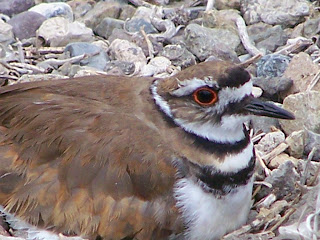 I took pictures of this Killdeer on the nest at San Joaquin Wildlife Sanctuary
I took pictures of this Killdeer on the nest at San Joaquin Wildlife Sanctuary
This little bird built its nest, or I should say scraped its nest in the gravel alongside the path near the Audubon House. I first saw it on the monthly walk at SJWS and later again a different week. Killdeer nest in gravel and flat surfaces and depend on camouflage and distraction displays to keep their eggs and young safe. Killdeer are part of the plover family. Plovers are small shore birds with bills that are short and thick. Killdeer are the only plover to have two bands across the chest. They also have a red ring around each eye. You can see it in the shot above.
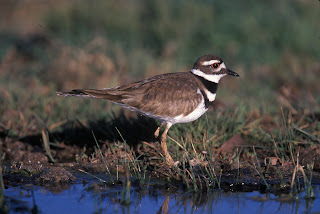
Killdeer Photo Courtesy of the US Department of Fish and Wildlife
Killdeer are cute birds. They run around dashing from one thing to another like they have had too much caffeine. And are they loud! They don't call them Charadrius vociferus for nothing. Killdeer are nothing if not vociferous. They call loudly and repeatedly in flight, and are known to call at night. One of the few birds to do so. I can remember living by a wash near the future OC Performing Arts Center and hearing the Killdeer calling loudly all night long. It was not a restful bird song. They are named after the sound they make which sounds like Kill-dee, Kill-dee!! Which sounds like an alarm call. Like "Look out! Look out!" Or "Get out! Get out!" In spite of that, it is one of my favorite birds. I have seen it in fields, a parking lot by the Van Nuys Airport, a wash in Costa Mesa, Bolsa Chica, San Joaquin Wildlife Sanctuary, Upper Newport Bay Ecological Reserve aka Newport Back Bay , San Jacinto Wildlife Area, and many varied places.
 Killdeer in the reeds and foliage at the first pond. San Joaquin Wildlife Sanctuary.
Killdeer in the reeds and foliage at the first pond. San Joaquin Wildlife Sanctuary. Killdeer at Bolsa Chica
Killdeer at Bolsa Chica Killdeer eat many invertebrate (animals with no backbone) such as crustaceans, insects, worms and other like things in the fields, lawns, and shores they frequent. Sometimes they eat seeds. Like Snowy Egrets, they sometimes use a bit of foot action to stir things up and flush out their dinner.
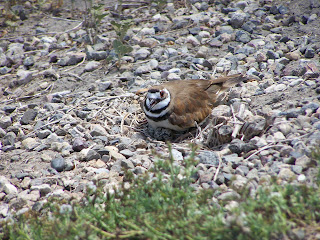
Killdeer getting uneasy about the presence of people on the path--which we never left. SJWS. Note the eggs under her breast.
Killdeer are widely distributed all over the United States. It is a shore bird, but is often seen far from shore in the desert, on the prairie, grass fields, asphalt parking lots, etc. Not exactly a nest-builder, it lays its eggs in a mere scrap in the ground or gravel. It has been known to nest lots of flat, fairly public, and unlikely areas including lawns and parking lots.
Killdeer eggs in the gravel. See how well they are camouflaged?
Killdeer put on a loud broken wing display to lure predators away from their nests. They flail and call loudly. It is quite a show. It's downright vociferous. Between the fact that the nest is so hard to see, and the distraction so loud and dramatic, it usually works. Even when I knew the eggs were there, it was really hard to see them. You can see them in the picture because I used my zoom to get a close-up. But if you pull back, in the midst of all that gray gravel, they seem to disappear.
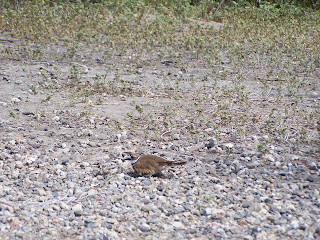
A shot with less zoom. See how hard it would be to see a little gray speckled egg?
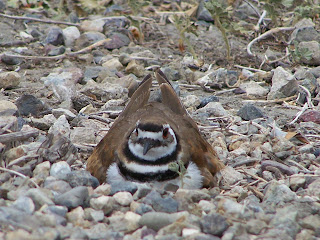 Mother Killdeer on the nest right near a path at San Joaquin Wildlife Sanctuary.
Mother Killdeer on the nest right near a path at San Joaquin Wildlife Sanctuary.From the front. I twist and turn for Photographs. Actually I was kind of far away. Digital and optical zoom brings it close. Taken with a Kodak Easyshare with 10x optical zoom --6.1 MP.

Killdeer Couple at San Jacinto Wildlife Area in Riverside County. Quite a place by the way.
OC Birder Girl Links
Birdwatching.com Killdeer Questions
Great Questions and answers about Killdeer nests.
Birdwatching.com's article about the Killdeer.
US Geological Survey's Killdeer Charadrius vociferus
Short, but good.
Article on Killdeer.
Animal Diversity Web: Charadrius vociferus
Detailed information.
Montana US Fish and Wildlife: Killdeer
External Plover Links and Resources
Encarta article on Plovers.
Canadian Encyclopedia
Photos of Killdeer
Google Photos of Killdeer
Vireo Photos of Killdeer
Videos of Killdeer
Internet Bird Collection of Killdeer Videos
Ask the OC Birder Girl














No comments:
Post a Comment